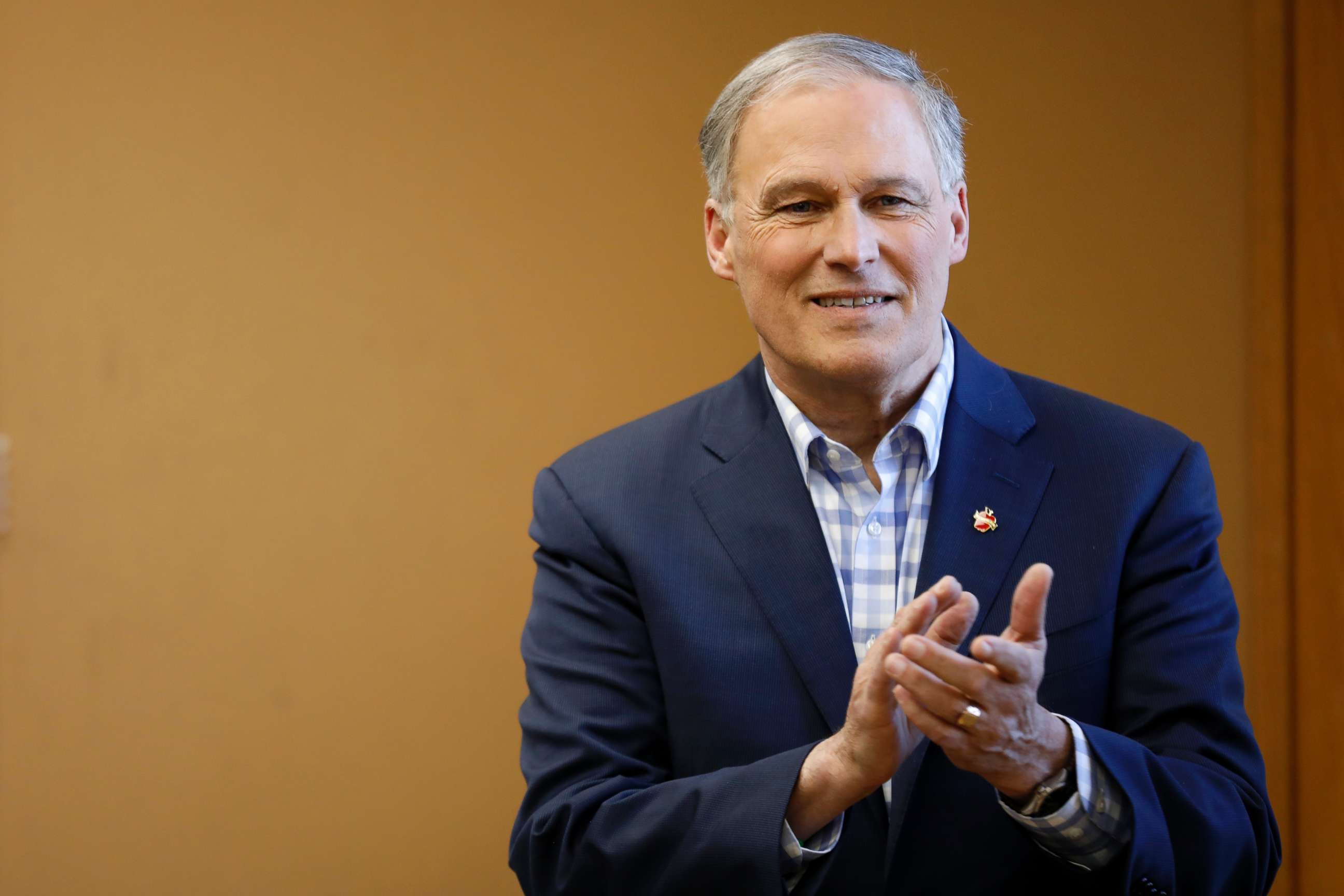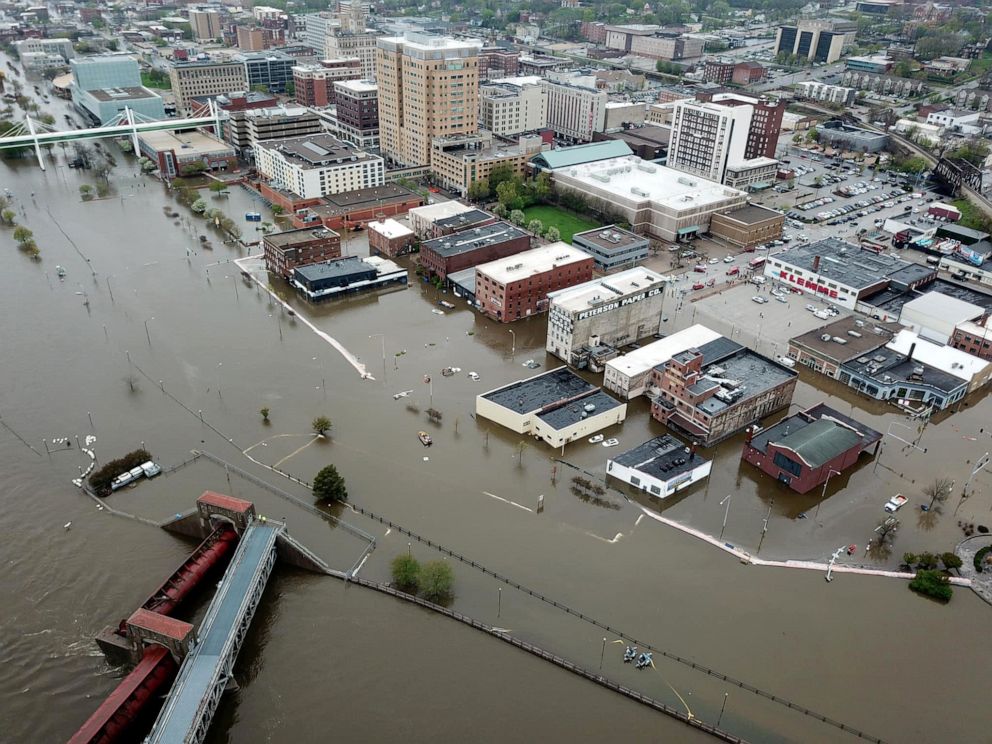2020 Democrats weigh in with sweeping plans to combat climate change
Jay Inslee dropped out of the race, but drove the discussion to the forefront.
Washington Gov. Jay Inslee may have dropped out of the presidential race, but in making his entire campaign about climate change he ultimately drove the discussion to the forefront.
When he unveiled the third phase of his climate agenda in June, Inslee looked to reimagine American foreign policy through the lens of combating climate change.
"The United States and the world stand at a crossroads unlike any we have encountered before," Inslee said in a statement at the time. "Within the next decade, either inaction will set in motion a worsening global climate crisis that will lead to devastation, or our nation and the world will respond decisively to build a modern, green and just global economic future. The choice is ours."
He detailed his policy during a speech at the Council on Foreign Relations in New York, on World Environment Day -- and timed it close to the anniversary of President Donald Trump pulling America out of the Paris Climate Accord.
Climate change is emerging as one of the 2020 election cycle's most pressing issues. In September, in lieu of a climate-centered debate, the 10 candidates who appeared at the ABC News Democratic debate in Houston, participated in back-to-back town halls on CNN devoted to climate change.

Notable among the candidates' statements were the frequent mentions of Inslee, who is now running for a third term as governor. But it was also an opportunity for the candidates to directly address the issue with voters.
A recent poll conducted by Harvard Institute of Politics of young people ages 18 to 29 found a substantial 14-point increase from the same poll they conducted in 2015 in those who said they believed "government should do more to curb climate change, even at the expense of economic growth."
Experts agree.
"This is the first time in our history climate change is going to be a voting issue, and a top theme of election 2020," said Dana R. Fisher, a professor whose work centers on understanding the relationship between environmentalism and democracy, most recently studying activism and American climate politics. "There's such momentum amongst active and progressive young Americans -- they're probably the most engaged electorate right now -- because the news just keeps getting worse and worse, and the American public is listening and going to put pressure on their candidates. They're shining a light on this, and there's momentum for candidates to speak about the issue."
Former Texas Rep. Beto O'Rourke had a four-pillar, $5 trillion plan to combat climate change just days before Inslee. He has since ended his presidential bid.
In June, former Vice President Joe Biden rolled out his first climate policy and called for "a clean energy revolution and environmental justice" in his new proposal to address what he called "the climate disaster facing the nation and our world."
His proposal pledges to go further than the climate platform undertaken by the Obama-Biden administration, and gives support to the framework of the Green New Deal being pushed by progressive Democrats like Rep. Alexandra Ocasio-Cortez, D-N.Y., calling it "a crucial framework for meeting the climate challenges we face."
Ocasio-Cortez previously criticized Biden over reports he was considering a "middle ground" policy on climate change.
The proposal also calls for investing in new infrastructure that can withstand the effects of climate change -- and create new jobs. The former senator, who famously commuted via Amtrak to Washington from his home in Delaware, also hopes to spark "the second great railroad revolution" with his plan, expanding high-speed rail across the country.

On the same day Biden released his climate change plan, Sen. Elizabeth Warren, D-Mass., also unveiled a plan she dubbed the "Green Manufacturing Deal," which would pump $2 trillion into green jobs and technology innovations in the U.S. The plan is part of a new series of policies Warren will continue to roll out that focus on investing in American jobs and innovation and are coupled with an attack on outsourcing by "multinational corporations with no allegiance to America," she wrote.
She also released a plan this summer on protecting public lands that would roll back many of Trump's environmental policies, halt offshore drilling on publicly owned lands and restore original boundary lines for two national monuments that were shrunk under the current administration.
Former presidential hopeful Sen. Cory Booker, D-N.J., released the specifics of what he calls his "environmental justice plan," which he says would take "immediate steps" to strengthen the power of the Environmental Protection Agency, which he accuses the Trump administration of "gutting."
Booker and fellow former presidential candidate California Sen. Kamala Harris along with Warren and a number of their Senate colleagues running for president, including Sens. Bernie Sanders, support the Green New Deal, while Sen. Amy Klobuchar, D-Minn., said she sees it as "aspirational."
On his campaign website, Sanders describes climate change as the "the single greatest threat facing our planet," while Booker refers to it as an "economic and national security crisis" on his Senate web page.
Former Maryland Rep. John Delaney, who also ended his nearly three-year-long presidential bid, recently unveiled a $4 trillion plan taking aim at the fossil fuel industry by proposing a steep tax on products and services that emit carbon pollution, while eliminating government subsidies for fossil fuel corporations unless they invest in a controversial technology that captures pollution out of the air and stores it.
Proposing such a bill in Congress would be a major legislative hurdle, but it could create opposition within the fossil fuel industry if natural gas producers see it as a method of gaining an advantage over the coal sector, according to Barry Rabe, a professor at the University of Michigan who specializes in environmental policy.
"If I'm a natural gas producer," Rabe said, "I'm looking at this and thinking, 'Wow, there'd be a carbon price that would further crowd out coal. Maybe I'm a net winner on this because the carbon content of natural gas is so much lower than coal.'"
Additionally, Delaney's proposal included major investments in green energy programs at the Department of Energy, additional renewable energy tax credits, new grant programs, and the establishment of a "Climate Corps" that would create programs for recent high school graduates to work on green initiatives in their communities.
"It's definitely not the most aggressive plan," said Fisher, the University of Maryland professor. "I think this one is trying to get more centrist voters."
ABC News' Jeff Cook and Stephanie Ebbs contributed to this report.




